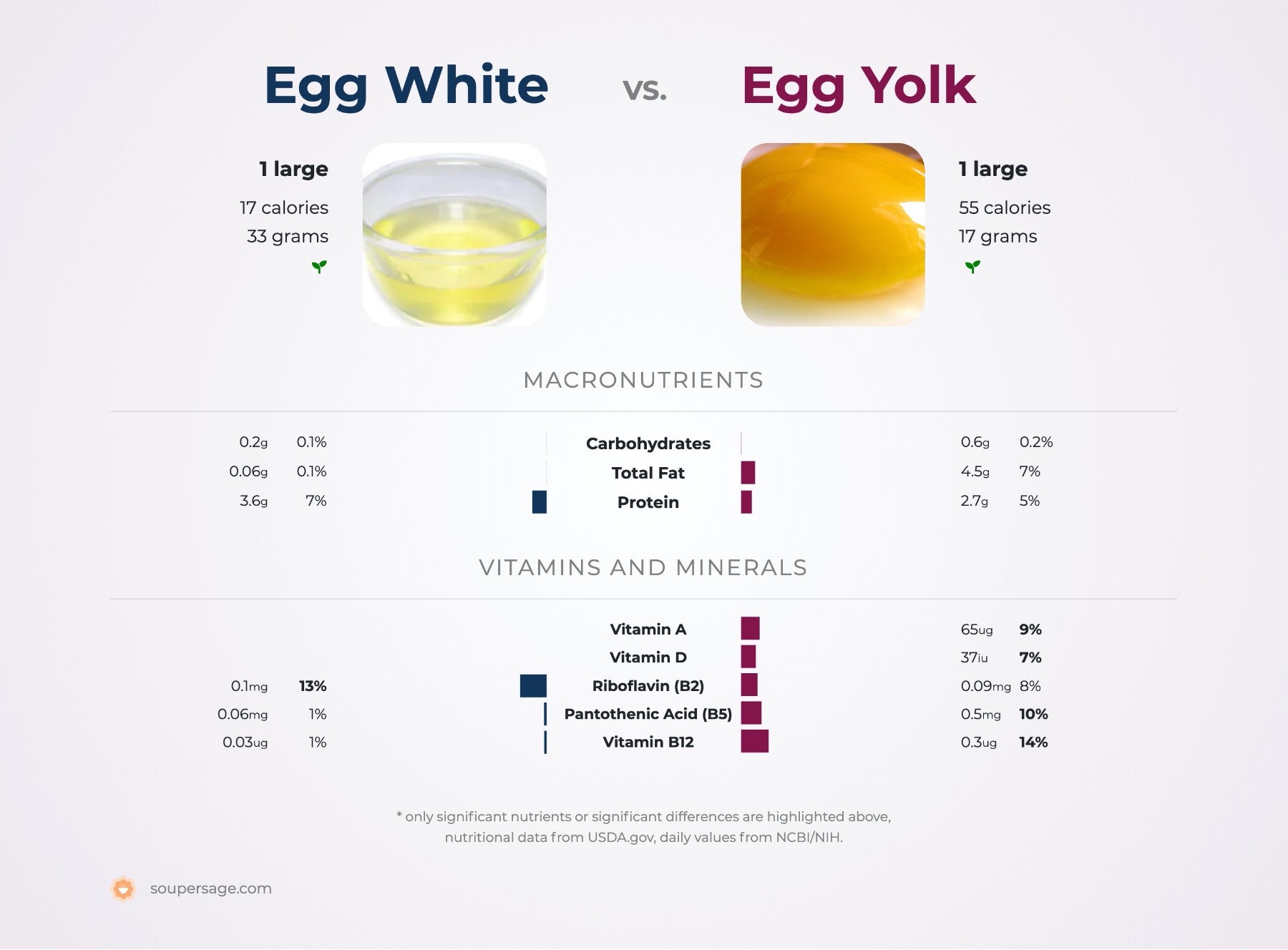Contents
Egg whites, also referred to as albumen or glair/glare, present themselves as a captivating and impeccably clear liquid. This transparent marvel holds a significant role in both culinary endeavors and scientific explorations, revealing the multifaceted enchantment concealed within the fragile shell. As we delve into the discussion on the calorie content of egg whites, it’s important to note that hens produce it from layers of secretions originating from the anterior portion of their oviducts during the egg-laying process, regardless of whether the eggs are fertilized or unfertilized. Egg whites encase the yolk, safeguarding it from harm while contributing vital nutrition to developing embryos.
- Egg whites are a low-calorie, high-protein food source.
- They constitute 67% of all protein in eggs.
- Despite their nutritional benefits, some individuals may have difficulty consuming egg whites due to allergies or dietary restrictions.
In comprehending the calorie composition of egg whites, it’s imperative to grasp the fundamentals. Approximately 90% of egg whites consist of water, with proteins such as albumins, mucoproteins, and globulins comprising the remaining 10%. Compared to egg yolks, egg whites are notably low in fat and carbohydrates, boasting a high lipid content. Remarkably, close to 56% of an egg’s protein content resides in the egg white. Not limited to their role as a culinary staple in crafting delightful delicacies like meringue and mousse, egg whites showcase their versatility across various domains.
Composition Of Egg White:
Diving deeper into the composition of egg white, albumen harbors the primary protein known as ovalbumin. With time, especially after six months of cold storage, it transforms into s-ovalbumin, constituting up to 80% of its composition—a phosphoglycoprotein classified as phosphoglycoprotein. Ovalbumin’s resilience against heat is notable, remaining unaffected when in solution, although physical stresses can lead to rapid denaturation, with a denaturation temperature of 84°C.
The complexity of egg white extends to an ovotransferrin/conalbumin complex, capable of binding bi- and trivalent metal cations. However, this complex is more sensitive to heat than the ovalbumin counterpart. Under specific pH conditions, typically between 5 to 6, the complex reaches its isoelectric point, demonstrating its ability to bind two cations and display red or yellow coloration. Notably, these metal complexes exhibit higher heat stability than their native forms.
Adding to its multifaceted nature, egg whites feature ovomucoid, a heat-resistant glycoprotein that not only serves as an allergen but also inhibits trypsin. In the intricate dance of culinary chemistry, egg whites bring both versatility and nutritional value to the table. 🍳✨ #EggWhiteComposition #CulinaryWonders #NutritionalAlchemy

How Many Calories in Egg White?
How Many Calories In Egg White?
In the delicate embrace of a 60-gram egg, the egg white emerges as a subtle hero, contributing approximately 17 calories to the nutritional narrative. Beyond its caloric grace, egg whites stand tall as exceptional protein sources, presenting a fat-free offering that complements a healthy diet. However, the true treasure trove of nutrients and nearly half of the protein resides in the yolk, a golden powerhouse in its own right.
Boiled eggs, a timeless and versatile culinary delight, weave their way into our daily lives with ease. Whether adorning our breakfast plates, enhancing salads, nestled in sandwiches, or enriching curries, boiled eggs effortlessly bridge the gap between health and convenience. Each white egg, when boiled, attains a wholesome 74 calories or 310 kcal per 60 grams, making it not just a culinary staple but a nutritional ally in our daily culinary adventures.
How Many Calories Are In Fried Egg White?
The number of calories in egg whites varies just because of oil and ghee, which are used for frying eggs. So, calories in egg white fried depend on the type, amount, and type of fat that is used for this purpose. Nevertheless, there are so many variables that affect the calories of eggs white that a precise calorie count is not possible.
Can I Eat Two Egg Whites Every Day?
Despite their low fat and cholesterol content, egg whites have a lot of nutrients. Thus, they are a good choice for people who must limit their cholesterol intake and for people who want and are trying to lose weight. So, taking two egg whites every day is a safe and secure food choice.
What Happens If We Eat Egg White Daily?
If we are taking egg white daily, it’s a good source of protein for us. High-quality protein contributes to the development of muscles, and it may help individuals maintain a healthy weight by keeping them feeling full longer and more energized. A 17-calorie egg white has 3.6 grams of protein, which makes it an excellent source of protein. The amount of protein consumed each day is approximately 5 percent.
Egg whites are Low In Fat and Cholesterol Free:
Eggs, which contain a high level of saturated fat and cholesterol, have been considered a controversial food choice. Egg yolks contain all of the cholesterol and fat. While egg whites are almost entirely free of fat and cholesterol, they are high in protein.
Egg whites were regarded as healthier than whole eggs for many years. Despite the cholesterol in eggs, most people are not affected by it, according to new studies.
In rare cases, however, eating cholesterol can elevate blood levels in hyper-responsive people. The ApoE4 gene, for instance, predisposes hyper-responders to high cholesterol. The egg white may be a better choice for people with high cholesterol or those with diabetes.
Due to their relatively low-fat content, egg whites contain significantly fewer calories compared to whole eggs. For people who want to reduce the number of calories they consume and lose weight, egg white may be an excellent choice.
Egg whites are Low In Calories but Rich In Protein:
Egg whites, the unsung heroes of nutrition, boast high protein content and a low-calorie profile. They’re a versatile culinary gem, containing 67% of all the protein found in eggs. Whether in omelets, smoothies, or baked goods, egg whites are a delicious and healthy addition to any meal. All nine of the nine essential amino acids found in this protein are present in the amounts your body needs to perform at its best. This protein is high in quality and complete.
High levels of protein are found in egg whites, making them beneficial for your health.
Eating egg whites can help curb your appetite, so you might feel fuller for a long time.
It’s also possible to lose weight by eating a lot of protein, as it can build muscle and maintain muscle mass. Calories in Egg whites are a good option for people determined to lose weight since they don’t provide very much protein for a few extra calories.
| Egg White | Whole Egg | |
| Calories | 18 | 71 |
| Protein | 4 grams | 6 grams |
| Fat | 0 grams | 5 grams |
| Cholesterol | 0 grams | 186 mg |
| Vitamin A | 0% of the DV | 27% of the DV |
| Vitamin B12 | 0% of the DV | 19% of the DV |
| Vitamin B2 | 11% of the DV | 18% of the DV |
| Vitamin B5 | 1% of the DV | 15% of the DV |
| Vitamin D | 0% of the DV | 19% of the DV |
| Choline | 0% of the DV | 27% of the DV |
| Selenium | 8% of the DV | 27% of the DV |
Problems With Health of Egg whites :
Despite their high protein content and low-fat profile, egg whites may not be suitable for everyone due to dietary restrictions or allergies. The likelihood of infants being allergic to eggs is greater than that of adults, and most children grow out of an allergy by the age of five. There is a higher incidence of allergic reactions against egg whites than against egg yolks. While egg whites contribute to the culinary symphony for many, it’s essential to acknowledge that, for some individuals, they might play a discordant note. Beyond allergic reactions, egg whites have the potential to trigger food intolerances in certain individuals.
- Poisoning By Salmonella
When considering calories in egg white do consider Salmonella in eggs as well. In the case of thoroughly cooked egg whites (not runny), there is no direct line of contact between the bacteria and the foods we eat. However, cross-contamination can occur if someone handles contaminated eggs and then touches another food item.
- Deficiency Of Biotin:
Biotin can be obtained from cooked eggs. Raw egg whites, however, may cause biotin deficiency, as the avidin in the whites tightly binds biotin, preventing it from being absorbed.
- How Many Calories in Egg White?
- Answer: On average, a 60-gram egg white contains approximately 17 calories. Despite being low in calories, egg whites are rich in protein, making them a valuable addition to a balanced diet.
- Can I Eat Two Egg Whites Every Day?
- Answer: Yes, consuming two egg whites daily is generally safe and beneficial. Egg whites offer essential nutrients and protein, aiding muscle development and satiety, making them a suitable choice for those seeking a low-calorie, high-protein dietary option.
- Potential Health Issues with Egg Whites:
- Answer: While egg whites offer numerous health benefits, individuals with allergies or intolerances may experience adverse reactions. Additionally, raw egg whites contain avidin, which can hinder biotin absorption, potentially leading to deficiencies if consumed excessively. Proper cooking eliminates the risk of salmonella poisoning from egg whites, but cross-contamination remains a concern, emphasizing the importance of safe food handling practices.



Leave a Reply